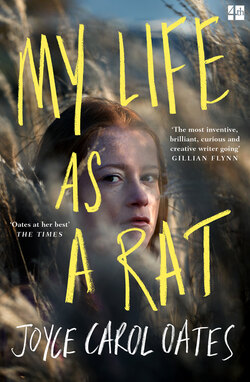Читать книгу My Life as a Rat - Joyce Carol Oates - Страница 14
To Die For
ОглавлениеGROWING UP, WE KERRIGAN KIDS KNEW THAT OUR DADDY would die for us. No one had to tell us, we knew. Of course, the concept “to die for” was not in our vocabularies. Still, we knew.
In our father’s big Irish Catholic family in Niagara Falls he’d been raised with the conviction that families stuck together. Irish immigrants had had a hell of a hard time coming to America, hadn’t even been considered “white” in some quarters, like Italians, Greeks, and Jews, until even the 1950s. And so, the Irish stuck together, in theory at least.
Not in theory, but in reality, and crucially, a family had to protect its own. You might quarrel with relatives, a brother or a sister, you might quarrel with your parents but essentially you stuck together, you never deserted or betrayed one another. You never went outside the family—that was unforgivable.
Inside the family you never lied when it really mattered, and you never cheated.
Siding with your brother against your cousin, but with brother and cousin against the stranger.
You would die for your family and you would (maybe) die for your (close) friends the way soldiers would die for their (close) buddies.
Something like this, Jerome Kerrigan had truly seemed to feel for his immediate family, if not all of the Kerrigans. And for the guys in his platoon in Vietnam, he dared not recall without his eyes welling with tears and his mouth working to keep still.
If Daddy was suspicious of strangers he was almost naively trusting of relatives and friends. Often he did household repairs for no payment, wouldn’t hear of being paid except in drinks, hospitality, reciprocal favors. That was friendship—loyalty, paying back what you owed. Being generous.
He lent money to people who, he had reason to know, probably wouldn’t be able to repay him; he lent money without interest, knowing that this was a disadvantage, for those to whom he’d lent money would repay the lenders who’d demanded interest, and not him. Yet, Daddy could not bring himself to lend money with interest—that was not how he saw himself.
And so, Daddy lent money to his heavy-drinking brothers. He provided bail bond for Kerrigans who found themselves on the wrong side of the law—business fraud, bad checks, failure to pay alimony, embezzlement. He did favors for guys in the plumbers’ union, for guys he’d gone to school with who’d had bad luck. He respected bad luck—it could happen to anyone.
The more kids you have, the more possibilities for bad luck. That was a grim fact.
The most extravagant thing Daddy did, that I remember from my childhood, was helping one of his younger sisters buy a house in Buffalo, so that she and her husband could live near her husband’s family, who would help her nurse her husband afflicted with some terrible wasting disease like multiple sclerosis. Our mother had not liked this arrangement, she’d sighed and fretted and all but wept over the phone, for a large amount of money was involved, but in Daddy’s presence she did not dare complain for, as Daddy would’ve pointed out to her, he was the one with a salary.
At the same time, you did not wish to cross Jerome Kerrigan.
You did not wish to find yourself on his shit list. For there were many on this list who were, in Daddy’s eyes, fucked.
Forgiving was rare. Forgetting, rarer.
And the closest you were to Daddy, the harder for Daddy to forgive.
He liked to quote an Italian adage—Revenge is a dish best served cold.
Another remark he favored from the boxing world was What goes around comes around. Which was more hopeful for it seemed to mean not just bad but good, too. The good you do will be returned to you. Eventually.
